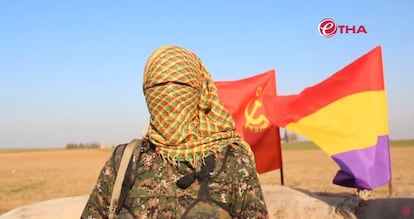The Spaniards fighting Islamic State in Syria and Iraq
At least two young men are known to have joined Kurdish militias battling the extremists


The wars in Syria and Iraq have attracted thousands of foreign fighters, many of them from Europe, and the vast majority of them rallying to the cause of an international jihad. But media coverage of the brutality of the Islamic State (IS) is galvanizing support abroad for the groups fighting it, particularly the Kurdish militias, and some of their members are from Spain.
A group of Spanish volunteers belonging to a far-left splinter group called Reconstrución Comunista (Communist Reconstruction) arrived in Syria at the beginning of the year, joining a battalion made up of other foreign fighters based in the city of Ras al Ayn, close to the Turkish border, and controlled by the Kurdish People’s Protection Units (YPG) militia that opposes both IS and the regime of Bashar al-Assad.
We are not fighting against Muslims, but against the fascism that Islamic State represents” Spanish volunteer ‘Paco Arcadio’
The Spanish fighters say they have been given training and have already been sent to fight on the front line. A few weeks ago, one Spanish volunteer using the nom de guerre of Paco Arcadio tells EL PAÍS, he and other foreign troops took part in an operation against IS forces that left 15 jihadists dead.
“With the exception of a few comrades from our organization, nobody knew we were coming. But there are times when you have to leave your own happiness, and that of the people who matter most to you,” says Arcadio in one of a series of telephone interviews conducted with EL PAÍS over recent weeks. He has refused to say exactly how many Spaniards are fighting alongside him, admitting only to two others. Spanish intelligence sources say the figure is higher.
The legality of fighting abroad
In February, eight Spaniards were arrested for allegedly having fought alongside pro-Russian militias in Ukraine, sparking a debate about the legal situation of foreign nationals fighting in overseas conflicts.
Paco Arcadio and his comrades-in-arms know they face legal repercussions when they return to Spain after fighting in Syria and Iraq, and have called on the Spanish government to promise not to take legal action against anybody who joins the Kurdish militias. “Demonstrating in Paris isn’t going to defeat IS, and it’s time the government followed up its words with actions,” says Arcadio.
The Dutch Public Prosecutor’s office recently announced that it would not be taking legal action against several members of a motorcycle club who joined the Kurdish militias to fight IS.
Arcadio says he and his fellow fighters have taken up arms to fight IS in the interests of the “international proletariat” and to support the “revolutionary” fight of the Kurdish forces: “This is not a fight against Islam, but for peaceful co-existence between different cultures, and not just in favor of the Kurds, but all humanity. We cannot accept simplistic arguments that Islam is to blame. We are not fighting against Muslims, but against the fascism that Islamic State represents, in the same way that people fought in Spain in 1936 or in Stalingrad in 1943.”
Sinjar is a key objective in the fight against IS, whose forces attacked the city last summer, killing hundreds of Yazidi Kurds, with several thousand fleeing to nearby mountains. Since then, the US has supported efforts to create an escape corridor, but the city remains under IS control.
Taking Sinjar would be hugely significant, allowing the Kurds to cut IS’s supply lines between Syria and Iraq. The operation will be complicated, given the infighting between the different groups thrown together in the struggle against the jihadists. Aside from the Kurds, there are Yazidi and Christian militias, along with armed groups from Turkey, and the Kurdish administration in Iraq’s peshmerga forces.
Arcadio says now is the time to launch an all-out offensive against IS, which he describes as “demoralized” after its forces were expelled from the Syrian city of Kobanî and Tikrit in Iraq. “We have seen in the YPG’s attacks, even when they are better armed and the YPG has fewer numbers, that IS retreats, leaving their wounded comrades and weapons behind,” he says. The Washington-based Institute for the Study of War think tank shares this assessment, seeing the recent IS attacks in Yemen and Libya as “aimed at countering perceptions of its decline in Iraq.”
In recent weeks, one Australian and one British national have been killed fighting alongside Kurdish militias, but Arcadio says he accepts the risks: “We will fight until there is just one bullet in the magazine, which we’ll use to make sure they don’t take us alive. We’re not going to give IS the pleasure of executing us in public.”
Tu suscripción se está usando en otro dispositivo
¿Quieres añadir otro usuario a tu suscripción?
Si continúas leyendo en este dispositivo, no se podrá leer en el otro.
FlechaTu suscripción se está usando en otro dispositivo y solo puedes acceder a EL PAÍS desde un dispositivo a la vez.
Si quieres compartir tu cuenta, cambia tu suscripción a la modalidad Premium, así podrás añadir otro usuario. Cada uno accederá con su propia cuenta de email, lo que os permitirá personalizar vuestra experiencia en EL PAÍS.
En el caso de no saber quién está usando tu cuenta, te recomendamos cambiar tu contraseña aquí.
Si decides continuar compartiendo tu cuenta, este mensaje se mostrará en tu dispositivo y en el de la otra persona que está usando tu cuenta de forma indefinida, afectando a tu experiencia de lectura. Puedes consultar aquí los términos y condiciones de la suscripción digital.








































